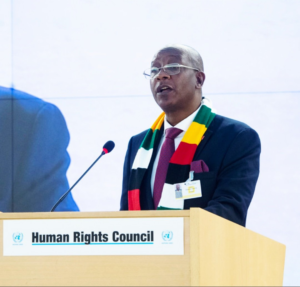THE 2017 COUP IN ZIMBABWE: POWER, GENOCIDE, AND ESCAPING ACCOUNTABILITY
Former Central Intelligence Organisation (CIO) deputy Director-General Lovemore Mukandi has said that the reason behind the 2017 coup in Zimbabwe was more than just keeping their positions. He says that President Emmerson Mnangagwa and his allies in the military wanted to avoid being held accountable for their roles in the Gukurahundi genocide.
The late former president Robert Mugabe was the mastermind of Gukurahundi. Mnangagwa, who was the State Security minister during the genocide, was widely seen as the enforcer. He was supported by several other ministers, including Enos Nkala, Maurice Nyagumbo, Nathan Shamuyarira, Simbi Mubako, Sydney Sekeramayi, Dzingai Mutumbuka, and Frederick Shava. These ministers were known to play big roles in this violent period.
Some Zapu defectors, like Callistus Ndlovu and John Mbedzi, along with Mark Dube, a member of Zanla, became famous as agitators during this time. Mnangagwa even declared Mbedzi, who was a former Zanu Matabeleland South chairperson after his defection from Zapu, as a national hero in 2018. This caused tension with Vice President Kembo Mohadi, who was a Gukurahundi victim and also a political rival to Mbedzi.
Nkala and the three, Ndlovu, Dube, and Mbedzi, became notorious in Matabeleland. With help from Nyagumbo, the Zanu commissar at the time, they beat the drums of the Gukurahundi conflict, spreading fear and destruction.
Mukandi also pointed out that military leaders in the 1980s, including retired General and current Vice President Constantino Chiwenga, were key players in the Gukurahundi killings. At the time, Chiwenga was the commander of the 1st Infantry Brigade in Bulawayo. Many senior army commanders have been named as essential parts of this violent period.
The idea of leaders staging military coups to hold onto power and avoid facing charges for human rights abuses is not a new concept. Mukandi believes Mnangagwa, who took over as President of Zimbabwe after the 2017 military coup, fits into this pattern. Mnangagwa, together with his close allies in the military, led the coup to prevent Mugabe from appointing a successor. This move was likely out of fear that a new leader would expose their actions and crimes.
However, Mukandi suggests that Mugabe’s preferred successor was Sekeramayi, who Mukandi implies was not involved in Gukurahundi. But evidence shows that Sekeramayi was also one of the agitators during this dark chapter. Therefore, it is unlikely he would have taken steps to hold the perpetrators accountable, even if he had come into power.
During the 2017 coup, the Zimbabwean military, which had a history of human rights abuses, took control of the country’s key government institutions. They forced Mugabe to step down from power. Mnangagwa, who had served as Vice President before he was dismissed by Mugabe right before the coup, took control as the new leader.
After the coup, military leaders who played key roles were given powerful positions in Mnangagwa’s government. This rewarded them for their efforts and helped ensure their continued loyalty. It also showed how military intervention in politics can be dangerous and lead to leaders staying in power by force, without being held responsible for their actions.
Mukandi’s statements point to a deeper motive behind the 2017 coup in Zimbabwe. It was not only about gaining power but also about escaping responsibility for past crimes. Mnangagwa and his military allies were determined to keep their positions and privileges and avoid the consequences of their actions during Gukurahundi.
This situation in Zimbabwe is a reminder of how military involvement in politics can put human rights and justice at risk. When those in power are allowed to avoid accountability, it sends a message that crimes can be covered up through force. This can have lasting effects on a country’s future, leaving victims without justice and leaders without responsibility.
The events surrounding the 2017 coup in Zimbabwe highlight the risks of military intervention and the lengths to which some leaders will go to maintain control. For the people of Zimbabwe, it has been a hard reminder of the fragility of power and the impact of past atrocities that remain unaddressed.





It’s ridiculous how some people keep trying to bring up Gukurahundi as a way to undermine the current leadership. President Mnangagwa has done more to unite Zimbabwe and move the country forward than any other leader. Instead of focusing on the past, let’s look at the future and the positive changes under his leadership.This narrative is full of misinformation and seems designed to discredit Mnangagwa and Chiwenga. The military stepped in to save Zimbabwe from Mugabe’s disastrous leadership, not to avoid accountability. It’s time we stop entertaining these baseless claims and appreciate the stability the new administration has brought.
Once again, this article fails to understand the context and complexities of the 2017 coup. It wasn’t about avoiding accountability—it was a necessary step to stabilize Zimbabwe and prevent a leadership crisis. It’s disappointing to see how history is being manipulated to tarnish the image of leaders who have worked tirelessly for Zimbabwe. This article sensationalizes the coup without giving credit to Mnangagwa’s efforts to move the country forward.
The focus on Gukurahundi in this article is misleading. Zimbabwe has been making strides under Mnangagwa’s government, and constantly bringing up the past prevents us from achieving true unity and development.